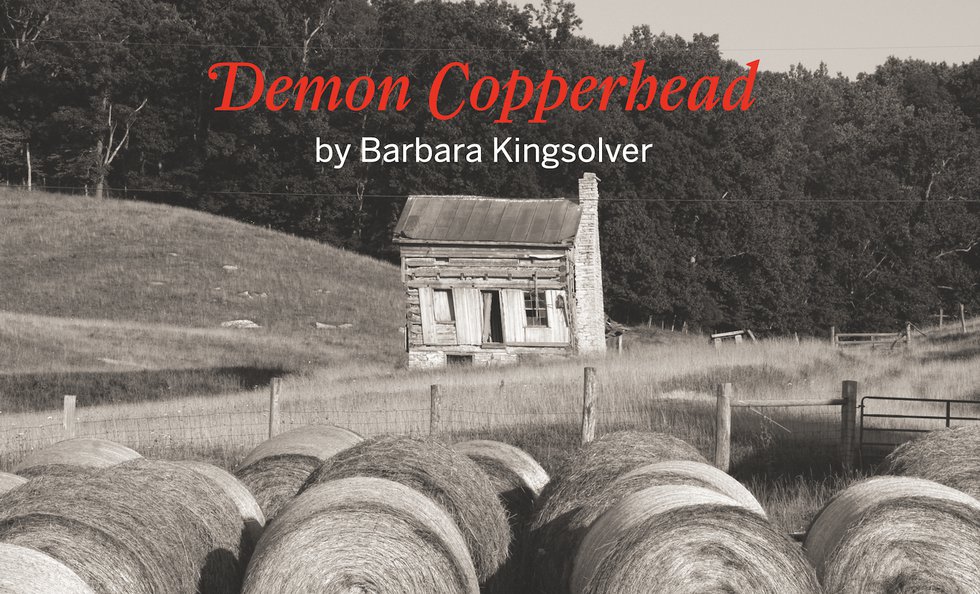Barbara Kingsolver’s latest novel follows an Appalachian orphan with a nod to Dickens.

Demon Copperhead by Barbara Kingsolver. Harper. pp.560. $32.50.
A number of years ago, I met Barbara Kingsolver at Harvest Table (the restaurant founded by the author and her husband, Steven Hopp) in Meadowview. As my husband and I feasted on delectable farm-to-table fare, the pair was seated at a table not far from us. The atmosphere was infused with magic, as Kingsolver took the time to chat a bit with everyone who approached her about her work, myself included. When I told her that I had been an English teacher prior to writing full-time, she said, “Oh, I love English teachers.” And while I had already fallen in love with her work, these words and the enthusiasm with which she delivered them have remained deeply planted.
Having read most of her novels, my excitement level grew to a fever pitch for the release of her newest work, Demon Copperhead, a modern-day retelling of Charles Dickens’s beloved David Copperfield that takes place in Appalachia. The coming-of-age story follows young Damon (his birth name) as he wrestles with his place in a part of Appalachia that was leveled by the opioid epidemic (an addiction that kills his mother) and a foster care system that neglected even the most basic of needs. And this life, with all its innumerable hurdles to jump, eventually becomes overwhelming for the sole narrator.
Throughout its nearly 600-page telling, Kingsolver does everything right, so that by the end of the story, it is not difficult to attach the word masterpiece to this novel. The author takes us on a journey with Demon that becomes more real than we’d perhaps like to acknowledge. But in Demon’s world, there is no escaping the brutal realities of life, as he hits one brick wall after another. “Anyone will tell you the born of this world are marked from the get-out, win or lose.” Any chance he has of moving in a different direction falls painfully short, as family and friends come from the same walk of life (poverty, abuse, and addiction).
Born to a single, teenage mom in a single-wide trailer, Demon’s chances of escaping a similar life are nearly non-existent. As with David Copperfield, Demon Copperhead reminds us that the problems children face from these struggles have yet to be solved.
Kingsolver tells this story in vivid detail, infusing humor and heartache and love. But perhaps the one thing that attests to Demon’s resilience is his relentless hold on hope. Kingsolver’s palette has room to pen a compendium of stories that highlight recovery. We owe the children that much.
Addressing injustice has become a part of Kingsolver’s focus throughout her writings, and this work is no exception. When Demon begins to see a very dim light at the end of the tunnel, after he is placed in the home of a high school football coach, his journey takes him even deeper into a hell that grows even more fiery. And because Demon is looking back on his life as he narrates his tale, his self-awareness allows Kingsolver ample opportunity to comment on the issues surrounding him.
According to Penelope Green’s The New York Times piece, the author shared a story with Green about the night she “communed” with Dickens. “Let the kid tell the story. No one doubts the child.” These words by the ghostly Dickens gave Kingsolver the “willies.” Afterwards, the author told her husband: “Hey, I just had this amazing conversation with Charles Dickens.” Hopp replied, “Did it end well?” Throughout the novel, this question is answered.
I was also fortunate several years ago to attend an event at The Martha Washington Inn & Spa in Abingdon where Kingsolver and fellow author Ann Patchett talked about writers and their friendships. It was not surprising to read in Green’s piece a comment by Patchett: “She [Kingsolver] means to save us by telling us stories. She comes closer than anyone else I know. She’s able to tell us things we desperately need to know in a way that makes it possible for us to hear it.” It’s easy to agree with Patchett.
We know all too well the atrocities created from the opioid epidemic. If just the stories of destruction are told, how will we move past the stereotypes and have new stories of recovery—particularly ones from the children who have suffered and who continue to suffer. What Kingsolver does with Demon Copperhead is always the first step: giving voice to the silent, and not so silent, cries for help. And as the epidemic continues (last year alone in the US, opioids contributed to more than 80,000 overdose deaths, according to The Observer), we need to be reminded that no clear end appears to be in sight. Through Kingsolver’s work, we have identified the variables, the insidious mix, which allow for the rise of these situations. Though the novel ends on a small high, the fact remains that not everyone has the will to overcome such difficulties. That is the true message here. That change needs to happen now so that stories can continue to be written, ones about a better Appalachia, with fewer broken families and rundown trailer parks.
Buy a copy at The Bookshop.
Kathleen M. Jacobs lives in West Virginia. She holds an M. A. in Humanistic Studies and writes books for young readers.








